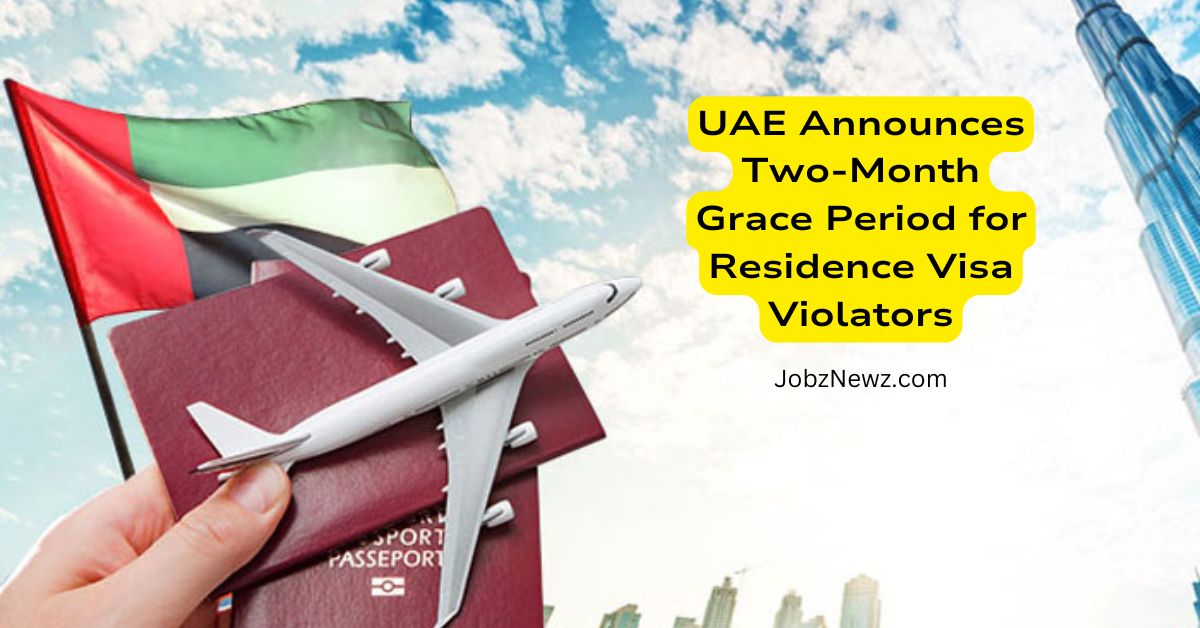The United Arab Emirates (UAE) has always been a land of opportunities, welcoming millions of expatriates from all corners of the world. Known for its rapid growth, economic prosperity, and diverse cultural landscape, the UAE is home to a significant expatriate population. However, like any other country, it has strict regulations when it comes to residency and immigration. Recently, the UAE authorities made a major announcement that will impact many residents and visitors: a two-month grace period for residence visa violators, starting from September 1, 2024.
What Does This Grace Period Mean?
The grace period announced by the Federal Authority for Identity, Citizenship, Customs, and Port Security (ICP) is a significant gesture from the UAE government. It allows individuals who have violated their residence visa terms to regularize their status without facing financial penalties. The grace period, which begins on September 1, 2024, and lasts until October 31, 2024, is designed to give violators a chance to either renew their visas or leave the country without incurring fines.
The decision is part of the UAE’s ongoing efforts to uphold its values of compassion and tolerance. The government recognizes that people may sometimes find themselves in difficult situations that prevent them from complying with visa regulations. By offering this grace period, the UAE is providing an opportunity for those individuals to make things right.
Who Can Benefit from This Grace Period?
The grace period is available to all individuals who have violated the terms of their residence visas. This includes those who have overstayed their visas or failed to renew them on time. Whether you are a resident, a tourist, or a visit visa holder, if you have overstayed your visa, this grace period is for you.
The grace period is particularly beneficial for expatriates who may have lost their jobs or faced other challenges that made it difficult for them to renew their visas. It also benefits tourists and visit visa holders who may have extended their stay in the UAE beyond the allowed period.
How to Take Advantage of the Grace Period
If you are a residence visa violator in the UAE, there are a few steps you need to take to benefit from the grace period:
- Visit the ICP Office: The first step is to visit the nearest ICP office or a designated immigration center. There, you can inquire about your specific situation and find out what steps you need to take to regularize your status.
- Submit the Necessary Documents: Depending on your situation, you may need to submit certain documents to renew your visa or apply for an exit permit. These documents may include your passport, visa copy, and other relevant paperwork.
- Pay Any Outstanding Fees: While the grace period exempts you from fines, you may still need to pay any outstanding fees related to your visa. This could include renewal fees or exit permit fees.
- Adjust Your Status or Leave the Country: Once your documents are processed and any outstanding fees are paid, you can either renew your visa and continue living in the UAE or leave the country without facing any penalties.
Why the UAE Is Offering This Grace Period
The UAE government’s decision to offer this grace period is rooted in its commitment to fairness and compassion. The authorities understand that people can sometimes find themselves in difficult situations, whether due to job loss, financial difficulties, or other personal challenges. By offering this grace period, the UAE is giving people a chance to correct their mistakes and move forward without the burden of fines or legal consequences.
This decision also aligns with the UAE’s broader goals of maintaining social harmony and ensuring that everyone living in the country complies with the law. By offering a way for violators to regularize their status, the UAE is helping to create a more orderly and law-abiding society.

The Importance of Complying with UAE Residence Visa Rules
While the grace period is a welcome relief for many, it’s important to remember the importance of complying with the UAE’s residence visa rules. The UAE has a well-defined legal framework for immigration, and all residents and visitors must adhere to these rules.
Residence visas in the UAE are typically issued for one, two, or three years, depending on the type of visa and the sponsor. Self-sponsored visas, such as the Golden Visa, can be valid for up to five or ten years. It’s important to keep track of your visa’s expiration date and renew it promptly to avoid any penalties.
In 2023, the UAE government standardized the penalties for overstaying visas. Residents, tourists, and visit visa holders who overstay their visas now face a fine of Dh50 per day, reduced from the previous amount of Dh100. While this reduction is helpful, it’s still a financial burden that can add up quickly if you’re not careful.
For expatriates, the grace period following the cancellation or expiration of a residence visa can be up to six months. During this time, you can either renew your visa, find a new sponsor, or leave the country. It’s crucial to take action during this grace period to avoid fines and other legal consequences.
The Role of the Federal Authority for Identity, Citizenship, Customs, and Port Security (ICP)
The ICP plays a central role in implementing the UAE’s immigration policies and ensuring that all residents and visitors comply with the law. The authority is responsible for issuing visas, handling visa renewals, and managing the entry and exit of individuals in the country.
As part of its mandate, the ICP is also responsible for enforcing the grace period announced for residence visa violators. The authority will undertake all necessary measures to ensure that violators can take advantage of this opportunity to regularize their status. This includes waiving fines, processing visa renewals, and issuing exit permits as needed.
The ICP’s role in this process is crucial, as it ensures that the grace period is implemented smoothly and effectively. By providing clear guidance and support to violators, the ICP is helping to make the process as straightforward and stress-free as possible.
Here is how to get a job offer from Canada in UAE!
What Happens After the Grace Period Ends?
Once the grace period ends on October 31, 2024, the usual penalties for residence visa violations will be reinstated. This means that individuals who have not taken advantage of the grace period to regularize their status may face fines and other legal consequences.
It’s important to act during the grace period to avoid these penalties. If you’re unsure about your status or what steps you need to take, it’s a good idea to consult with an immigration expert or visit the nearest ICP office for assistance.
The UAE’s announcement of a two-month grace period for residence visa violators is a significant move that reflects the country’s values of compassion and tolerance. This grace period provides a valuable opportunity for individuals who have violated their residence visa terms to correct their status without facing financial penalties.
If you find yourself in this situation, taking action during the grace period is important to regularize your status or leave the country. By doing so, you can avoid fines and other legal consequences and continue to enjoy the many opportunities the UAE offers.
Remember, the grace period is only available from September 1, 2024, to October 31, 2024, so take advantage of this opportunity while it lasts. If you have any questions or need assistance, don’t hesitate to reach out to the ICP or consult with an immigration expert. The UAE is offering this grace period as a gesture of goodwill, and it’s up to you to make the most of it.
Please confirm with the authorities before submitting any fees or documents. We as a website Jobznewz.com are not responsible for any misleading or wrong news.


